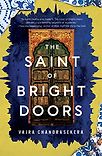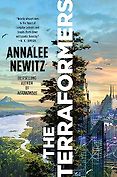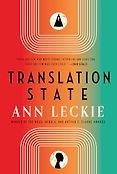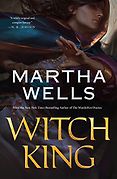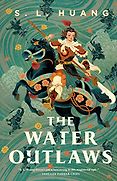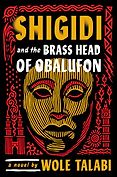This looks like a great selection of recently published science fiction and fantasy novels. Can you tell us more about the Nebula Awards, and how their shortlists are drawn up?
The Nebula Awards, now in their 59th year, are organised by the Science Fiction and Fantasy Writers Association. Members vote for the best new science fiction and fantasy works published in the United States during the previous year.
This year’s nominated novels are diverse in worlds and tone. If there is a uniting theme, it is the maturity and subtlety of the politics. There are no straightforward epics against dark forces here: instead there are treaties and diplomats, seditionists and divided governments, unwilling complicity and unintended consequences. Two stories—Wells’ and Newitz’s—tackle an extended timeline in order to explore what happens after political victory. And Wells offers a simple retort to those who want to burn the world in anger: “Unfortunately, someone else has already burned it. We need to unburn it.”
The field was strong, and Vajra Chandrasekera’s The Saint of Bright Doors, which has been declared the best new sci-fi or fantasy novel of the year, is stunning. I think readers of all tastes will find something to suit them on this wide-ranging menu.
Brilliant. Can we step through each of the books on the shortlist for the Nebula Award for the best new novel? Let’s start with The Terraformers, by previous Five Books interviewee Annalee Newitz.
The Terraformers is, explicitly, a book concerned with imagining hopeful futures. In the far future, the Anthropocene is over: it ended in ‘The Farm Revolutions,’ a seismic event only ever alluded to in passing, which culminated in ‘The Great Bargain.’ This bargain is the foundation for rapprochement between life forms. Democracy is now directly participatory, and diverse life forms are included as persons with a right to inclusion; capitalism is still the organising principle, and an antagonistic force throughout the novel.
The novel takes place on a privately-owned planet being terraformed, Sask-E. We begin from the perspective of a ranger from the ERT – the Environmental Rescue Team – but don’t get too settled: this is a novel in three parts, from the perspective of three protagonists who live centuries apart. Each is shaped by the political decision-making of the last, so that the overarching story is one of slow-burn political change, constantly in need of renegotiation. In each section, struggles over the use and ownership of the environment must be resolved, while the travails of personal relationships provide the book’s warmth.
Sounds like a novel full of big ideas.
Newitz has enough ideas in Terraformers for ten novels – expect talking moose, an array of hominid species, and sentient trains – and tackles a whole range of themes. Personhood, and its relationship to intelligence and ability to consent, are particularly central: if personhood is tied to intelligence, but persons are designed and decanted with their intelligence pre-determined, what are the implications? And what labour can be asked of a conscious being without the intelligence to enter the bargain? The lines between artificial intelligence and organic have long been blurred in this world, and these questions affect everyone.
Fascinating. The second novel on the 2024 shortlist is Ann Leckie’s Translation State. Would you introduce us?
Again we have three narrators, but this time their stories are interwoven. Enae is given a diplomatic mission to find a fugitive’s descendent, which no one expects hir—the novel develops its own rich system of pronouns—to fulfil. Reet is an ordinary labourer who finds himself unexpectedly caught up in embassy work and becomes Enae’s minder; his genetic history is unknown, and competing groups lay claim to him over the course of the story. Qven is growing up in the most alien world of this universe, a mysterious place where children are raised in groups, progress through bizarre developmental stages, and eat each other regularly. Those who survive are intended for an uncertain service – which becomes gradually clearer as the novel progresses.
The social structure of this world sounds complex.
Leckie perfectly balances the drip feed of information. She withholds enough to let curiosity drive your reading; she keeps revealing enough to satisfy. Crucially, you want to understand the world better in order to know whether your beloved characters – and these characters are highly loveable – are going to be alright: what exactly are they caught up in, here? Plot development and world building, then, are cleverly tied together.
This novel takes place in the Imperial Radch universe, alongside the Imperial Radch trilogy and two short stories, but it is self-contained. For readers of the trilogy, the political ramifications of the earlier books can be spotted here. It’s a great all-rounder: Berkeley Fiction Review said that with this newest novel, the series as a whole now “has something for everybody: power and politicking, friendship and found family, cannibalism and comfort food.”
Cannibalism and comfort food! Quite the combination. But let’s move on; tell us about Witch King by Martha Wells, the third book on the shortlist for the 2024 Nebula Award for the best science fiction or fantasy novel.
Witch King is an evocative fantasy novel. Kaiisteron is a demon, and given a body in our world by a bargain with the Saredi – a civilisation that is destroyed shortly after by invaders known as the Hierarchs. The novel jumps between two timelines: the resistance to the Hierarchs, and the later plot against the nascent new regime that took their place, the Rising World. In the one, we watch the development of the personal relationships that are now at stake in the other.
Witch King is dripping in atmosphere: this is a world of flooded stone halls, captured boats and bespelled whales. There are some especially striking scenes in the metaphysically-mysterious underearth, true home of the demons; and a memorably claustrophobic hunt. The magic is underexplained, to good effect. Expect cantrips and intentions wielded by expositors and witches and the Immortal Blessed, and magic that draws on pain and death for its power – but don’t expect to know exactly what all of these are.
This is a tonal departure from Wells’ most famous works, the Murderbot Diaries series. Wells previously declined two Nebula nominations for that series to open the floor for highlighting other writers.
Next up we have The Water Outlaws by S. L. Huang, billed as a work of epic fantasy. Why is it one of the best fantasy novels of 2024?
The Water Outlaws retells the fourteenth century Chinese novel attributed to Shi Nai’in, The Water Margin. It begins with the viewpoint of Lin Chong, a rare female arms instructor, who quickly receives an infuriatingly unjust criminal sentence. From multiple viewpoints we are then drawn into two worlds, the ministers of the Empire and the rebel bandits who oppose them – and the complicit pawns stuck in between. Magical elements – gods teeth, dark demons and alchemy – are present, but these are only one kind of technology in a whole tool belt, and the most terrifying blows are often dealt with metal spikes and fists.
Action-packed, then.
The Water Outlaws never slows its pace. Huang makes it clear early on in the novel that horrific things can and will happen to people in this world, and are difficult to predict, depending as they do on the whims of the powerful. This ensures your rapt attention at every half-sign of danger. The bandits are loveable and varied, the villains truly teeth-grindingly villainous. In her forward warning readers of the themes to come, Huang concluded: “I hope this is primarily a joyous, toothy escapist adventure, one in which a group made up almost entirely of women and queer folk – who are in equal parts devastating, powerful, righteous, and terrible – stand up as self proclaimed heroes to tear the world asunder.” She succeeds.
I think that brings us to the last of the nominees for the 2024 Nebula Award for the best new sci-fi or fantasy novel: Wole Talabi’s Shigidi and the Brass Head of Obalufon.
Shigidi and the Brass Head of Obalufon is a museum heist and a love story, but the heist is on behalf the creator God, and the thieves – and love-story protagonists – are a nightmare god and a succubus. Strap in.
We’re caught up in the political machinations of the Yoruba pantheon, organised here into the Orisha Spirit Company. Shigidi, an unprepossessing nightmare god, has been bringing in very little for the company and lives a hard life for a god. Nneoma, the succubus, has been working as a free agent, preferring to feed on spirit directly rather than be a company functionary. She persuades Shigidi to join her, displeasing his superiors, and ultimately resulting in their obligation to complete a heist – the retrieval of an artifact from the British Museum, kept behind both mundane and magical protection.
This book is fun. It’s exactly as sexy as you’d expect, and the pace doesn’t let up for a moment. Gary K. Wolfe reviewed the book for Locus magazine, describing it as a “kinetic mix of noir heist fiction, erotic romance, political intrigue, and supernatural fireworks.” Well, exactly.
Does that bring us to the winning book? This is The Saint of Bright Doors by Vajra Chandrasekera, winner of the 2024 Nebula Award for the best new sci-fi or fantasy novel.
Fetter is unchosen: his deified father did not take him on as a Saint, but left him instead with vengeful Mother-of-Glory. She raises him as a weapon to kill his father. Refusing this destiny, Fetter tries to make himself a new life in the city of Luriat, joining a support group for other unchosen children and navigating city life as best he can. Luriati culture is full of fascinating touches, but one is key: in Luriat, all doors must have a window or opening of some kind. A solid door left closed for too long is in danger of sealing itself shut, vanishing from the other side, and becoming the strange Luriati phenomenon known as a Bright Door.
Of course, Fetter cannot so easily leave his past behind. For a start, he has no shadow, can float, and sees devils. But more to the point neither Mother-of-Glory nor his father, the Perfect and Kind, will allow it. His destined patricide puts him in tension with forces both mundane and supramundane, driving the novel’s tension.
The world of The Saint of Bright Doors feels real, as though Luriat and Fetter’s village of Acusdab might just be places you haven’t visited yet. The Bright Doors receive just the right amount and kind of attention from the Luriati, so that they feel like one of the unexplained phenomena of our own world; Fetter treats his hidden abilities to float and see devils just as any of us might treat a shameful difference or secret. This sense of reality is a fine art. In the novel’s more surreal passages, Chandrasekera achieves the equally-difficult quality of a dreamlike higher reality, that sits beyond the logic of our surface world but doesn’t seem less satisfying for it – rather it seems, somehow, more true.
The Saint of Bright Doors is an astonishing debut. Writing for The New York Times, Amal El-Mohtar called it “the best book I’ve read all year. Protean, singular, original… I can’t remember the last time a book made me so excited about its existence, its casual challenge to what a fantasy novel could be.”
July 11, 2024. Updated: November 18, 2024
Five Books aims to keep its book recommendations and interviews up to date. If you are the interviewee and would like to update your choice of books (or even just what you say about them) please email us at [email protected]
Five Books interviews are expensive to produce. If you've enjoyed this interview, please support us by donating a small amount.

